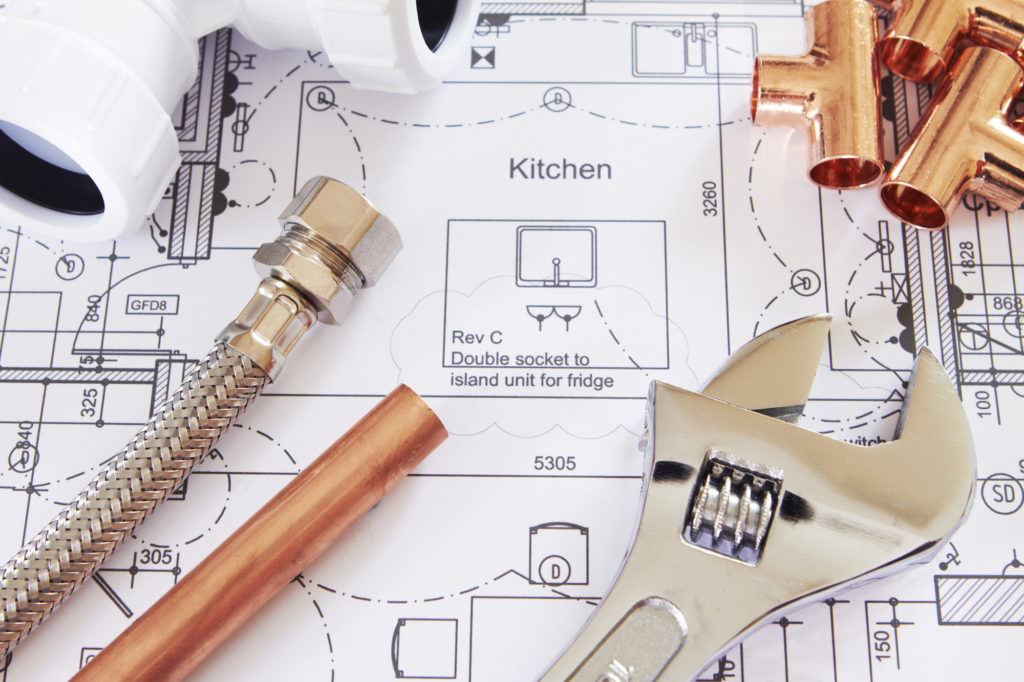
Plumbing problems can happen without warning. From leaky pipes to clogged drains to broken water lines, almost everyone will experience a plumbing problem at some point.
That’s why it’s important to know what to do when it happens.
Fortunately, there are several plumbing tips you can use to reduce the risk of lasting damage to your home.
The Top Signs You Are in Need of a Plumber
Most homeowners know it is time to call a plumber when a toilet becomes clogged, something starts leaking, or their sink backs up. Yet, how else can you tell when you are in need of a plumber?
Fortunately, there are some early signs you can be on the lookout for indicating that there are problems with your home’s plumbing before these problems become more serious.
Here are a few of the signs you can look out for in your home.
Slow Drains
A clear sign that you need to contact a plumber is if your shower or sink has been draining more slowly than usual. Slow draining likely indicates a block in the drain, and that the drain will become clogged in the near future.
While you may be tempted to try over-the-counter drain products, these are usually only temporary solutions that can actually damage your plumbing over time due to the harsh chemicals that are in them.
Plumbers in Toronto can properly fix the drain without damaging your pipes, preventing a clog from forming.
Toilet Troubles
You may also be able to detect problems with your toilet before it becomes clogged, saving you the trouble a broken toilet can cause. if your toilet makes strange gurgling sounds when you flush it, then you likely have a block somewhere in your line.
You may also have problems with your sewage line if your toilet bowl fills too high or too low when you flush it.
Low Water Pressure
Another indicator that you are in need of a plumber is if the water pressure in your home suddenly drops.
If the water pressure throughout your home seems to be lacking lately, then it is likely that you have a fractured pipe or a leak somewhere in your system, as this would cause a drastic drop in water pressure.
You will want to have this problem fixed immediately before more extensive damage occurs.
Is It time for a Plumbing Re-pipe?
Major investments in your home’s infrastructure can be daunting. However, you should understand how time and age can affect your pipes.
Many homes built before the 19805 are reaching their plumbing expiration dates. Unfortunately, internal pipe corrosion is something you may not be able to detect until it is too late.
Older Homes
In homes that are even older, the question is not if, but when. Without repiping, failure of your plumbing will occur. And together the costs of repairs and replacing plumbing can be extremely expensive.
Just think about the damage to your home from a burst pipe or slow leak. Water destroys and warps drywall and wood. And then you have to fix your home and replace your pipes.
Prioritize your Expenses
If you have an older home, call a licensed and bonded journeyman plumber to come and inspect today.
A plumbing repipe is not the end of the world. And today more affordable options are available. Of course, for many copper is the “go-to” standard.
However, innovation in plastic polymers led to the development of an affordable and worthwhile alternative PEX.
Repipe with Kitchen and Bath Remodeling
Maybe you are already thinking about remodeling your kitchen or bath. Then now is also a perfect time to think about repiping your home. If you are thinking about investing in your home, use the opportunity to repipe during a kitchen and bath remodel.
One of the best investments in your home is remodeling the kitchen and bathrooms.
This is mainly because:
1. Repiping your home now prevents the costly expenses of later repairs.
2. Improving your home’s plumbing is a valuable investment in your home.
Insurance Plumping Claims Tips
Interior water damage has the potential to cost a homeowner a lot of time and money. A leaking water heater, broken ice maker, or busted plumbing pipe can lead to catastrophe.
Water damage can ruin personal property and also lead to a dwelling s drywall, ceiling, flooring, and fixtures being destroyed.
Therefore it is important to call the certificated professionals at East Texas Leak Locators immediately after observing water damage.
The Insurance Claims Process
If water damage and a plumbing leak are observed by a homeowner, it is important to try to minimize the damage as soon as possible. When filing an insurance claim, the agency in charge of the homeowners’ policy needs to be contacted so they can create a claim.
Due to water damage being present and having a chance to get worse as time goes on, the agent’s office will typically advise the policyholder to contact a plumber right away to stop the leak and take measures to decrease the amount of water damage within the home.
The homeowner should also turn off the water and if standing water is observed, he or she should get towels and fans to try and stop the problem.
A plumber will most likely need to arrive on-site before the insurance claims adjuster, therefore the homeowner needs to take photos of the initial water damage and leak.
Common Septic Dangers to Avoid
The basics of caring for a septic system are simple. Don’t flush thick paper towels, feminine hygiene products, baby wipes, or kitty litter.
Make sure you use a screen if you expect to lose a lot of hair and try not to flush foreign objects. But there are hidden dangers that can permanently destroy the delicate bacteria inside your septic tank and cause a septic emergency.
Your septic system works by taking the water from your laundry room, bathroom, and kitchen and storing it all in an underground tank. The tank holds the wastewater so solids can settle to the bottom, while oil and grease float to the top.
Good bacteria feeds off the sludge and scum, keeping your tank balanced.
Vinegar
While vinegar is less dangerous than harsh antibacterial cleansers, it can still stress the bacteria that eat your septic waste. This means you should avoid excessive DIY cleansers and pouring things like pickle juice down the drain.
Bleach and antibacterial soaps
Chlorine bleach in moderation are perfectly safe, but even just a tablespoon of certain drain cleaners containing bleach can completely kill the beneficial bacteria in your septic tank.
Most septic-safe cleansers will say they are safe right on the bottle.
Medications
Don’t flush antibiotics and make sure you keep an eye on your septic system if anyone in your home is on certain medications like chemotherapy drugs. Some medications can harm the beneficial bacteria in your septic tank.
Avoid Drain Cleaner
If you are experiencing a clog in one of your drains, one of the easiest solutions is to buy a cheap drain cleaner and have it clear out the clog. While this can be a short-term solution, it can lead to significant wear and tear on your plumbing system.
Drain Filter
One of the best things that you can do for your drains is to use a drain filter, which should be placed at the very top of the train. This will help to catch larger pieces of debris that would otherwise get caught in the drain.
This can help to prevent more serious clogs from even forming.
Invest in Water Softener
If you live in an area with natural hard water, investing in a water softener would be very beneficial. Hard water has a range of different minerals and compounds that get stuck in drains and slowly cause clogs and deterioration.
A water softener will be able to reduce these minerals and help purify the air.
What to Do in a Plumbing Emergency
In a plumbing emergency, contact a professional plumber right away. While you wait for your plumber to arrive, follow these tips:
Shut the water off
The first step in a plumbing emergency is to turn off the nearest water source as quickly as possible. If only one appliance is creating a problem, shut that fixture off first. For leaking pipes or other large emergencies, you will need to turn off your home’s main water valve. Turn each valve clockwise to shut it off.
Turn off your water heater
After the main water valve is turned off, make sure to turn off your water heater. Turning the water heater off prevents heat from increasing inside the unit, which creates the risk of it overheating. Always turn off the gas first if you have a gas water heater.
Open outside spigots
Water will remain in your pipes after the main water valve has been shut off. Turning on your outside spigots will drain the pipes and direct the excess water away from your home.
Put These Plumbing Tips to Use
Getting your home’s plumbing ready will save you time, money and major inconvenience. Your primary concern is protecting pipes that are at risk of bursting.
Your first step is to locate potential problem areas. Pipes in basements, crawl spaces, attics and outside facing walls need to be covered with some type of pipe insulation.
Pipes burst when the water inside them freezes and creates a blockage, the water between the blockage and your closed faucet is now under building pressure; this pressure causes the pipe to fail at its weakest point.
Keep this in mind these plumbing tips when preparing your home’s plumbing, and don’t forget to explore our blog for more handy tips and tricks.

